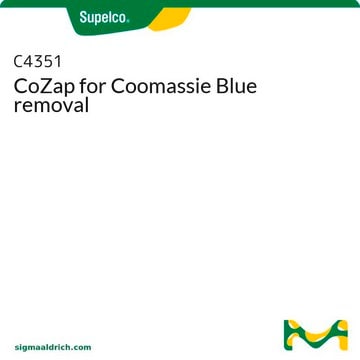B6529
Brilliant Blue R Staining Solution
ethanol solution
Synonym(s):
Brilliant Blue R, Acid Blue 83, Brilliant indocyanin 6B, Coomassie Brilliant Blue R
About This Item
Recommended Products
product name
Brilliant Blue R Staining Solution, suitable for (for immunoelectrophoresis protein staining)
form
liquid
Quality Level
color
dark blue
suitability
suitable for (for immunoelectrophoresis protein staining)
application(s)
diagnostic assay manufacturing
hematology
histology
storage temp.
room temp
SMILES string
[Na+].CCOc1ccc(Nc2ccc(cc2)C(\c3ccc(cc3)N(CC)Cc4cccc(c4)S([O-])(=O)=O)=C5\C=C/C(C=C5)=[N+](\CC)Cc6cccc(c6)S([O-])(=O)=O)cc1
InChI
1S/C45H45N3O7S2.Na/c1-4-47(31-33-9-7-11-43(29-33)56(49,50)51)40-23-15-36(16-24-40)45(35-13-19-38(20-14-35)46-39-21-27-42(28-22-39)55-6-3)37-17-25-41(26-18-37)48(5-2)32-34-10-8-12-44(30-34)57(52,53)54;/h7-30H,4-6,31-32H2,1-3H3,(H2,49,50,51,52,53,54);/q;+1/p-1
InChI key
NKLPQNGYXWVELD-UHFFFAOYSA-M
Looking for similar products? Visit Product Comparison Guide
Application
Components
Analysis Note
Legal Information
Signal Word
Warning
Hazard Statements
Precautionary Statements
Hazard Classifications
Eye Irrit. 2 - Flam. Liq. 3 - Skin Irrit. 2
Storage Class Code
3 - Flammable liquids
WGK
WGK 2
Flash Point(F)
81.0 °F - closed cup
Flash Point(C)
27.2 °C - closed cup
Personal Protective Equipment
Choose from one of the most recent versions:
Already Own This Product?
Find documentation for the products that you have recently purchased in the Document Library.
Customers Also Viewed
Articles
Sigma offers EZBlue™ and ProteoSilver™ reagents for protein visualization, suitable for proteomics and traditional PAGE formats.
Sigma offers EZBlue™ and ProteoSilver™ reagents for protein visualization, suitable for proteomics and traditional PAGE formats.
Sigma offers EZBlue™ and ProteoSilver™ reagents for protein visualization, suitable for proteomics and traditional PAGE formats.
Sigma offers EZBlue™ and ProteoSilver™ reagents for protein visualization, suitable for proteomics and traditional PAGE formats.
Our team of scientists has experience in all areas of research including Life Science, Material Science, Chemical Synthesis, Chromatography, Analytical and many others.
Contact Technical Service






